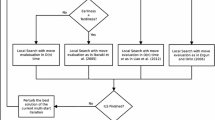Abstract
In this paper, we study the multi-machine scheduling problem with earliness and tardiness penalties and sequence dependent setup times. This problem can be decomposed into two subproblems—sequencing and timetabling. Sequencing focuses on assigning each job to a fixed machine and determine the job sequence on each machine. We call such assignment a semi-schedule. Timetabling focuses on finding an executable schedule from the semi-schedule via idle-time insertion. Sequencing is strongly NP-hard in general. Although timetabling is polynomial-time solvable, it can become a computational bottleneck if the procedure is executed many times within a larger framework. This paper makes two contributions. We first propose a quantum improvement to the computational efficiency of the timetabling algorithm. We then apply it within a squeaky wheel optimization framework to solve the sequencing and overall problem. Finally, we demonstrate the strength of our proposed algorithms by experiments.
Similar content being viewed by others
References
Balakrishnan, N., Kanet, J. J., & Sridharan, S. V. (1998). Early/tardy scheduling with sequence dependent setups on uniform parallel machines. Computers and Operations Research, 26, 127–141.
Cheng, R., Gen, M., & Tosawa, T. (1995). Minmax earliness/tardiness scheduling in identical parallel machine system using genetic algorithm. Computers and Industrial Engineering, 29(1-4), 513–517.
cnet.com (2001). http://news.cnet.com/news/0-1004-200-5867112.html.
Davis, J. S., & Kanet, J. J. (1993). Single-machine scheduling with early and tardy completion costs. Naval Research Logistics, 40, 85–101.
Garey, M. R., Tarjan, R. E., & Wilfong, G. T. (1988). One-processor scheduling with symmetric earliness and tardiness penalties. Mathematics of Operations Research, 13, 330–348.
Herrmann, J. W., & Lee, C.-Y. (1995). Solving a class scheduling problem with a genetic algorithm. ORSA Journal of Computing, 7(4), 443–452.
James, R., & Buchanan, J. (1997). A neighbourhood scheme with a compressed solution space for the early/tardy scheduling problem. European Journal of Operational Research, 102(3), 513–527.
Joslin, D., & Clements, D. (1999). Squeaky wheel optimization. Journal of Artificial Intelligence Research, 10, 353–373.
Kanet, J. J., & Sridharan, V. (2000). Scheduling with inserted idle time: problem taxonomy and literature review. Operations Research, 48(1), 99–110.
Kim, D. W., Kim, K.-H., Jang, W., & Chen, F. F. (2002). Unrelated parallel machine scheduling with setup times using simulated annealing. Robotics and Computer Integrated Manufacturing, 18, 223–231.
Lawler, E. L. (1977). A “pseudopolynomial” algorithm for sequencing jobs to minimize total tardiness. Annals of Discrete Mathematics, 1, 331–342.
Radhakrishnan, S., & Ventura, J. A. (2000). Simulated annealing for parallel machine scheduling with earliness-tardiness penalties and sequence-dependent set-up times. International Journal of Production Research, 38(10), 2233–2252.
Storer, R. H., Wu, S., & Vaccari, R. (1992). New search spaces for sequencing problems with application to job shop scheduling. Operations Research, 39(10), 1495–1509.
Szwarc, W., & Mukhopadhyay, S. K. (1995). Optimal timing schedules in earliness-tardiness single machine sequencing. Naval Research Logistics, 42(7), 1109–1114.
Tarjan, R. E. (1983). Data structures and network algorithms. Philadelphia: Society for Industrial and Applied Mathematics.
Zhu, Z., & Heady, R. B. (2000). Minimizing the sum of earliness/tardiness in multi-machine scheduling: a mixed integer programming approach. Computers and Industrial Engineering, 38, 297–305.
Author information
Authors and Affiliations
Corresponding author
Rights and permissions
About this article
Cite this article
Feng, G., Lau, H.C. Efficient algorithms for machine scheduling problems with earliness and tardiness penalties. Ann Oper Res 159, 83–95 (2008). https://doi.org/10.1007/s10479-007-0284-z
Published:
Issue Date:
DOI: https://doi.org/10.1007/s10479-007-0284-z




